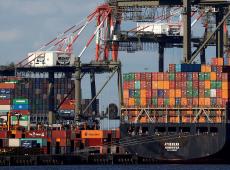Egypt, EU Invest to Combat Inflation, Currency Crisis
By Rediff Money Desk, Cairo Jun 29, 2024 19:26
Egypt and the EU launched a two-day investment conference to advance their strategic partnership, including a 7.4 billion euro aid package to address Egypt's economic crisis.
Cairo, Jun 29 (AP) Egypt and the European Union on Saturday opened a two-day investment conference to advance the implementation of their strategic partnership agreement that includes a 7.4 billion-euro (USD 8 billion) aid package for the cash-strapped Middle Eastern nation.
The March aid package includes both grants and loans over the next three years for the Arab world's most populous country. Most of the funds 5 billion euros (USD 5.4 billion) are macro-financial assistance to help Egypt shore up its economy, which is hit by a staggering shortage of foreign currency and soaring inflation.
In his opening remarks, President Abdel Fattah el-Sissi said the conference sends a powerful message of confidence and support from the European Union for the Egyptian economy and the economic reform measures implemented over the past 10 years".
The EU, represented by Executive Vice-President Valdis Dombrovskis, and Egypt will sign a memorandum of understanding for the short-term macro-financial assistance of up to 1 billion euros (USD 1.07 billion) to support Egypt's economic reform programme, the EU mission in Cairo said in a statement.
Other investment deals worth 40 billion euros (USD 42.8 billion) are scheduled to be signed with European companies as well as bilateral cooperation agreements with the EU to advance employment and skills, vaccines manufacturing, food security and sustainable development, it said.
In just 100 days, we have already brought new energy into our partnership. And this is just the beginning, European Commission President Ursula von der Leyen, who attended the conference, said. We are backing our new partnership with substantial public investments. But what truly makes a difference is that the private sector is also on board.
El-Sissi' government embarked on a massive reform programme in 2016 in return for loans from the International Monetary Fund. The reform has centred on floating the local currency, substantial cuts in state subsidies on basic goods, reducing public investment and allowing the private sector to become the engine of growth.
Most recently, the government once again floated the pound and sharply increased the main interest rate in March. Commercial banks are now trading the US currency at more than 47 pounds, up from about 31 pounds.
The measures are meant to combat ballooning inflation and attract foreign investment. They were also needed to meet IMF demands in order to increase its bailout loan from USD 3 billion to USD 8 billion.
The currency devaluation and subsidies cuts have inflicted further pain on Egyptians already struggling with skyrocketing prices over the past years. Nearly 30 per cent of Egyptians live in poverty, according to official figures.
The EU deal, which has drawn criticism from rights groups over Egypt's human rights record, came as concerns grow that economic pressure on Egypt and conflicts in neighbouring countries could drive more migrants to European shores.
Over a dozen rights groups, including Human Rights Watch and Amnesty International, urged the EU in a letter earlier this month to ensure that its bailout package "secures concrete, measurable, structural, and timebound human rights progress and reforms in the country.
Egyptian authorities have carried out a relentless crackdown on dissent for a decade, and rights groups have repeatedly called for Western governments to link improving rights conditions to financial assistance.
The March aid package includes both grants and loans over the next three years for the Arab world's most populous country. Most of the funds 5 billion euros (USD 5.4 billion) are macro-financial assistance to help Egypt shore up its economy, which is hit by a staggering shortage of foreign currency and soaring inflation.
In his opening remarks, President Abdel Fattah el-Sissi said the conference sends a powerful message of confidence and support from the European Union for the Egyptian economy and the economic reform measures implemented over the past 10 years".
The EU, represented by Executive Vice-President Valdis Dombrovskis, and Egypt will sign a memorandum of understanding for the short-term macro-financial assistance of up to 1 billion euros (USD 1.07 billion) to support Egypt's economic reform programme, the EU mission in Cairo said in a statement.
Other investment deals worth 40 billion euros (USD 42.8 billion) are scheduled to be signed with European companies as well as bilateral cooperation agreements with the EU to advance employment and skills, vaccines manufacturing, food security and sustainable development, it said.
In just 100 days, we have already brought new energy into our partnership. And this is just the beginning, European Commission President Ursula von der Leyen, who attended the conference, said. We are backing our new partnership with substantial public investments. But what truly makes a difference is that the private sector is also on board.
El-Sissi' government embarked on a massive reform programme in 2016 in return for loans from the International Monetary Fund. The reform has centred on floating the local currency, substantial cuts in state subsidies on basic goods, reducing public investment and allowing the private sector to become the engine of growth.
Most recently, the government once again floated the pound and sharply increased the main interest rate in March. Commercial banks are now trading the US currency at more than 47 pounds, up from about 31 pounds.
The measures are meant to combat ballooning inflation and attract foreign investment. They were also needed to meet IMF demands in order to increase its bailout loan from USD 3 billion to USD 8 billion.
The currency devaluation and subsidies cuts have inflicted further pain on Egyptians already struggling with skyrocketing prices over the past years. Nearly 30 per cent of Egyptians live in poverty, according to official figures.
The EU deal, which has drawn criticism from rights groups over Egypt's human rights record, came as concerns grow that economic pressure on Egypt and conflicts in neighbouring countries could drive more migrants to European shores.
Over a dozen rights groups, including Human Rights Watch and Amnesty International, urged the EU in a letter earlier this month to ensure that its bailout package "secures concrete, measurable, structural, and timebound human rights progress and reforms in the country.
Egyptian authorities have carried out a relentless crackdown on dissent for a decade, and rights groups have repeatedly called for Western governments to link improving rights conditions to financial assistance.
Source: ASSOCIATED PRESS
Read More On:
DISCLAIMER - This article is from a syndicated feed. The original source is responsible for accuracy, views & content ownership. Views expressed may not reflect those of rediff.com India Limited.
You May Like To Read
TODAY'S MOST TRADED COMPANIES
- Company Name
- Price
- Volume
- GTL Infrastructure
- 2.93 ( -4.87)
- 226206286
- IFL Enterprises
- 1.30 (+ 4.84)
- 81461564
- Vodafone Idea L
- 16.79 (+ 0.66)
- 67447398
- NCL Research
- 0.95 ( -4.04)
- 31996628
- Franklin Industries
- 3.73 (+ 3.32)
- 21511209
MORE NEWS

West Bengal Offers Potatoes at Rs 26/kg to Curb...
West Bengal Cold Storage Association offers to supply potatoes to the state government...

Panasonic Avionics Opens Software Facility in Pune
Panasonic Avionics opens a new software design and development facility in Pune, India,...

Karnataka Job Quota Bill: Biocon's Kiran...
Biocon Chair Kiran Mazumdar-Shaw urges exemption for highly skilled recruitment from...












 © 2024 Rediff.com India Limited. All rights reserved.
© 2024 Rediff.com India Limited. All rights reserved.